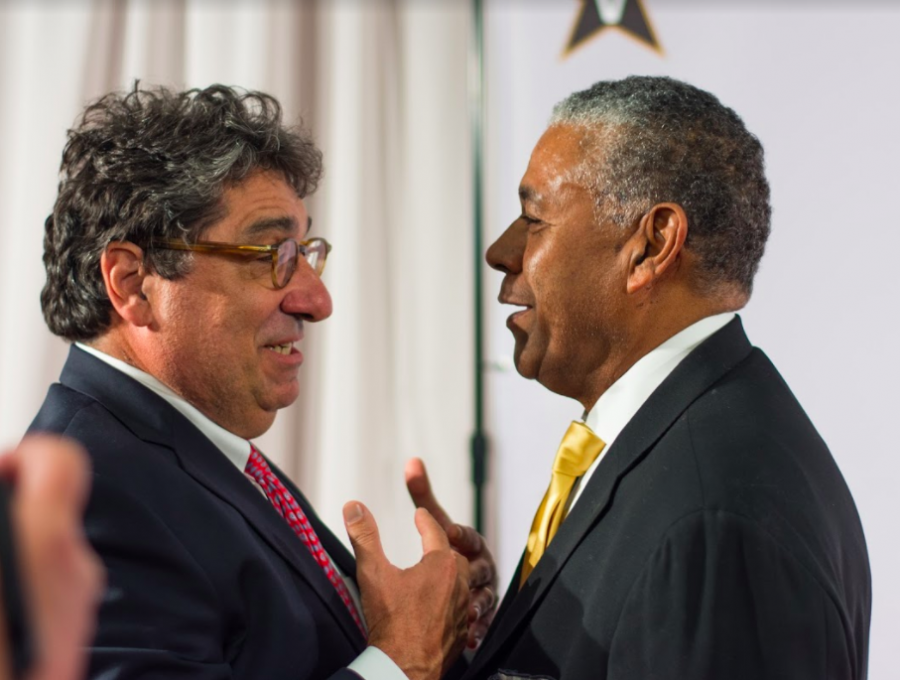Perry Wallace’s life embodied the word “triumph.”
From the first step Wallace ever took on Vanderbilt’s campus, he was entering a gauntlet. Becoming the first African-American basketball player in the history of the SEC forced him into a situation almost unfathomable for a college kid. He would face scrutiny, anger, and racism, and would have to endure it all. He never asked to be an activist. He never asked to be a trailblazer. But he never batted an eyelash.
Wallace passed away just three days before the premiere of Triumph: The Untold Story of Perry Wallace, a film directed by Rick Gentile, celebrating Wallace’s life and his accomplishments in breaking the color barrier in the SEC. He was 69 years old.
At the premiere, he was remembered by his family members, friends, and many others who walked down the red carpet at Langford Auditorium to speak about his legacy before the premiere.
“Perry was very very smart, a loving individual, caring, and thoughtful, just a person of immense character and immense strength,” said Vanderbilt Chancellor Nicholas Zeppos. “It would be tough to get him to raise his voice and speak ill of somebody. He was all about change and he was all about, ‘I’ve been in many ways called to do this,’ and he had to bury a lot of his feelings, a lot of his anger.”
“We laughed about our experiences here and we cried a little bit, too,” said Godfrey Dillard, who played alongside Wallace at Vanderbilt and became the second African-American basketball player in SEC history. “But his immortality is in place.”
The movie encapsulates Wallace’s life, painting him as one of the premier pioneering black athletes of the 20th century. With testimonials from greats such as Oscar Robertson, and narration from Forest Whitaker, the film trudges through the journey Wallace took, including some excruciating details. It includes trips to Mississippi State and Ole Miss that highlighted the bigotry toward African-Americans and Wallace in particular, as well as taking the audience through life on campus, where Wallace was also viewed as an outsider. Many of Wallace’s teammates, who were at attendance at the red carpet event and the premiere, spoke about how they seldom had Wallace’s back.
“I got to know Perry really really well,” said Zeppos. “For me the really interesting story about Perry is that he was an 18-year old kid all alone. There’s no Branch Rickey. There’s no team. It was a pretty lonely stage that Perry played on as an 18-year old kid. I think when you send your kid off to college or you see a kid or I see an 18 or 19-year old kid coming to us, well it’s like Perry was in engineering. It’s like, I’ve got to take calculus, I’ve got to take physics, and I’ve got to integrate the SEC. It’s a big load to place on a kid’s shoulders, because as much as a student, and as much as an athlete, Perry always excelled in both.”
“At that point in time, to be an athlete and be an activist, especially a college athlete, was almost unheard of,” said Vanderbilt Athletic Director David Williams. “If you were an activist at that time, and particularly if you were African-American, but for any activist for that matter anywhere, you couldn’t be an athlete. And so what you had give up to do that becomes part of you giving up a part of yourself.”
50 years later, Dillard is still in awe of how Wallace never fought back.
“[Perry] was from Nashville and knew about Nashville,” said Dillard. “I didn’t and I think that’s kind of where I ran into my problem. I was a little more aggressive and a little more flamboyant than I think those folks back in the day wanted me to be.
Looking at the landscape of Vanderbilt now, Dillard was extremely grateful for what he and Wallace were able to accomplish in Nashville. Decades after Wallace and Dillard fought for racial justice on Vanderbilt’s campus and throughout the SEC, the Vanderbilt women’s basketball team is trying to fight a battle of their own, with several players kneeling for the National Anthem. Dillard spoke about how Vanderbilt continues to be a place to create change.
“The fact that Vanderbilt broke the color barrier is an important part of their history and they should continue to promote it,” said Dillard. “We live in a diversified world now. The tapestry of the world is different and Vanderbilt’s tapestry of ethnicity and race and gender is totally different. And you got to promote that. That’s what’s going to draw young people to come to this school, not just for athletics, not just for academics, but this diversified group from all over the world. You can’t get away from the fact that you know Vanderbilt helped break the color barrier in the SEC.”
In an era where athletes throughout sports have taken a stand and welcomed politicism, Wallace’s breakthrough rings loudly.
“These are venues that Americans look to and change is right, in many ways, before their eyes,” said Zeppos. “I think this movie couldn’t come at a better time for our country, and the conversations that we’re having in athletics.”
Williams says that Vanderbilt basketball will continue to honor Perry Wallace throughout the season, and that he is in talks with the SEC about honoring him further.
“Stay tuned,” he said. “We’ll be doing something pretty soon at the basketball game.”
After a lifetime of triumphs, Wallace will be honored by the team, the SEC, and everyone around the country for the pathway he paved toward justice.



